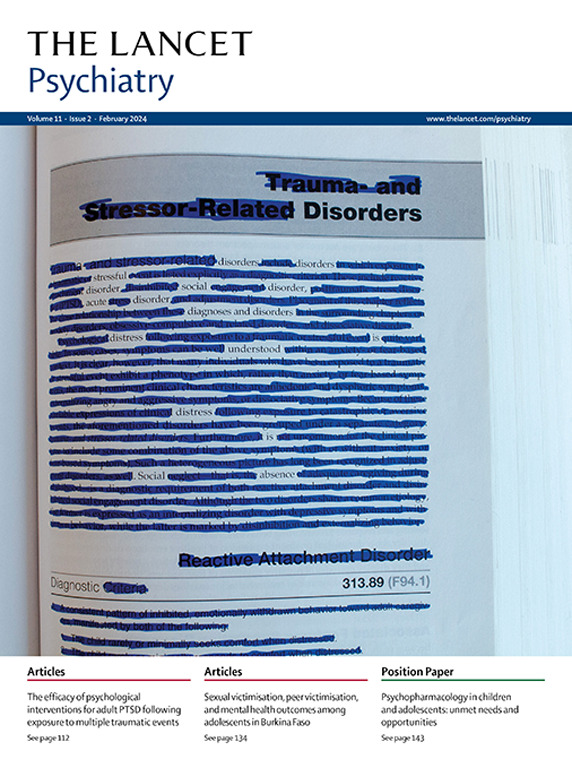Mindfulness-based cognitive therapy versus treatment as usual after non-remission with NHS Talking Therapies high-intensity psychological therapy for depression: a UK-based clinical effectiveness and cost-effectiveness randomised, controlled, superiority trial
IF 30.8
1区 医学
Q1 PSYCHIATRY
引用次数: 0
Abstract
Background
Non-remission after psychological therapy for major depressive disorder is common, yet there are no established further-line treatments. In the UK National Health Service (NHS) Talking Therapies programme, about 50% of patients with depression who come to the end of the stepped care pathway do not show remission of symptoms. We aimed to investigate whether mindfulness-based cognitive therapy (MBCT) can improve clinical outcomes and whether the additional financial cost is worthwhile.Methods
We conducted a parallel, randomised, controlled, superiority trial in three sites in the UK (Devon, London, and Sussex). Patients with current major depressive disorder whose symptoms had not reached remission (assessed as Patient Health Questionnaire-9 [PHQ-9] score ≥10) after an adequate dose of NHS Talking Therapies high-intensity therapy (≥12 sessions) were recruited from 20 NHS Talking Therapies services. Participants were allocated through remote random assignment (1:1) to MBCT plus treatment as usual or treatment as usual alone at the UK Clinical Research Collaboration-registered Exeter Clinical Trials Unit with minimisation on depression severity (PHQ-9 score <19 vs ≥19), antidepressant use at baseline (yes vs no), and recruitment site (Devon vs London vs Sussex). MBCT was delivered via videoconference and comprised an individual orientation session and eight weekly group sessions. The primary clinical outcome was reduction in depression symptomatology at 34 weeks after randomisation, using the PHQ-9. Cost-effectiveness was evaluated in terms of costs to primary, secondary, and tertiary health and social care services collected using the Adult Service Use Schedule and quality-adjusted life-years (QALYs) via health utilities derived from the EQ-5D. Primary outcome analyses were masked in the intention-to-treat population using observed data only. Lived experience experts were integral to all stages of this research. The trial was prospectively registered with ISRCTN, ISRCTN17755571.Findings
Between April 20, 2021, and Jan 24, 2023, we enrolled 234 eligible participants, 166 (71%) of whom identified as women, 65 (28%) as men, one (<1%) as other, and two (1%) preferred not to say. The mean age was 42·5 years (SD 13·9). 201 (86%) of 234 participants were White. 118 participants were assigned to MBCT plus treatment as usual and 116 to treatment as usual alone, 101 and 102 of whom completed the final follow-up, respectively. At 34 weeks after randomisation, the MBCT plus treatment as usual group had significantly lower levels of depression symptomatology than the treatment as usual alone group (adjusted between-group difference –2·49, 95% CI –3·89 to –1·09; p=0·0006; Cohen's d –0·41, 95% CI –0·67 to –0·15). Utility scores were higher and costs were lower in the MBCT group (adjusted mean cost difference –£245·23, 95% CI –581·92 to 91·46; p=0·15) over the course of the study. The MBCT plus treatment as usual group had an estimated 99% chance of being cost-effective at the £20 000 per QALY threshold. Bootstrapped mean differences in costs and QALYs indicated a 91% probability of MBCT plus treatment as usual being less costly and more effective than treatment as usual alone for all values a decision maker might be willing to pay for an improvement in QALYs. We observed no trial or treatment-related serious adverse events and no other evidence of harms.Interpretation
Our findings show that mindfulness-based treatment can be beneficial after non-remission from major depressive disorder following psychological, stepped care treatments. Together with evidence from previous studies of non-remission after pharmacological treatment, our findings establish MBCT, an easily scalable group-based intervention, as a further-line treatment. Implementation of MBCT for patients who continue to have major depressive disorder in routine care settings (NHS Talking Therapies and beyond) is warranted.Funding
UK National Institute for Health and Care Research Research for Patient Benefit programme.以正念为基础的认知疗法与NHS谈话疗法治疗抑郁症后的常规治疗:一项基于英国的临床效果和成本效益的随机对照优势试验
背景:重性抑郁障碍的心理治疗后无缓解是常见的,但目前还没有确定的进一步的治疗方法。在英国国民健康服务体系(NHS)的谈话疗法项目中,大约50%的抑郁症患者在结束阶梯式治疗途径后,症状没有缓解。我们的目的是调查基于正念的认知疗法(MBCT)是否可以改善临床结果,以及额外的经济成本是否值得。方法我们在英国的三个地点(德文郡、伦敦和苏塞克斯)进行了一项平行、随机、对照、优势试验。从20个NHS谈话治疗服务中招募了经过足够剂量的高强度治疗(≥12次)后症状未达到缓解(评估为患者健康问卷-9 [PHQ-9]评分≥10)的当前重度抑郁症患者。参与者通过远程随机分配(1:1)分配到MBCT加常规治疗或在英国临床研究合作注册的埃克塞特临床试验单元进行常规治疗,最小化抑郁严重程度(PHQ-9评分<;19 vs≥19),基线抗抑郁药使用(是vs否)和招募地点(德文郡vs伦敦vs苏塞克斯)。MBCT是通过视频会议进行的,包括每周一次的个人培训和八次的小组培训。主要临床结果是随机分组后34周抑郁症状减少,使用PHQ-9。使用成人服务使用表和通过EQ-5D衍生的卫生工具收集的质量调整生命年(QALYs)收集的初级、二级和三级卫生和社会保健服务的成本来评估成本效益。仅使用观察数据掩盖了意向治疗人群的主要结局分析。生活经验专家在这项研究的所有阶段都不可或缺。该试验在ISRCTN进行了前瞻性注册,注册号为ISRCTN17755571。在2021年4月20日至2023年1月24日期间,我们招募了234名符合条件的参与者,其中166名(71%)为女性,65名(28%)为男性,1名(1%)为其他,2名(1%)不愿透露。平均年龄42.5岁(SD 13.9)。234名参与者中有201名(86%)是白人,118名参与者被分配到MBCT加常规治疗组,116名参与者被分配到常规治疗组,其中101名和102名分别完成了最后的随访。在随机化后34周,MBCT加常规治疗组的抑郁症状水平明显低于单独常规治疗组(调整组间差异-2·49,95% CI -3·89至-1·09;p = 0·0006;Cohen’s d - 0.41, 95% CI - 0.67 ~ - 0.15)。MBCT组的效用得分更高,成本更低(调整后的平均成本差异- 245·23英镑,95% CI - 581·92至91·46;P =0·15)。MBCT加常规治疗组在每个QALY阈值为2万英镑时,估计有99%的机会具有成本效益。成本和质量年的平均值差异表明,从决策者可能愿意为质量年的改善支付的所有价值来看,MBCT加常规治疗比常规治疗更便宜、更有效的概率为91%。我们没有观察到与试验或治疗相关的严重不良事件,也没有其他危害的证据。解释:我们的研究结果表明,在心理护理治疗后,以正念为基础的治疗对未缓解的重度抑郁症患者是有益的。结合先前药物治疗后无缓解研究的证据,我们的研究结果确立了MBCT,一种易于扩展的基于群体的干预,作为一种进一步的治疗方法。在常规护理环境(NHS谈话治疗及其他)中,对持续患有重度抑郁症的患者实施MBCT是有保证的。资助英国国家卫生和护理研究所病人福利研究方案。
本文章由计算机程序翻译,如有差异,请以英文原文为准。
求助全文
约1分钟内获得全文
求助全文
来源期刊

Lancet Psychiatry
PSYCHIATRY-
CiteScore
58.30
自引率
0.90%
发文量
0
期刊介绍:
The Lancet Psychiatry is a globally renowned and trusted resource for groundbreaking research in the field of psychiatry. We specialize in publishing original studies that contribute to transforming and shedding light on important aspects of psychiatric practice. Our comprehensive coverage extends to diverse topics including psychopharmacology, psychotherapy, and psychosocial approaches that address psychiatric disorders throughout the lifespan. We aim to channel innovative treatments and examine the biological research that forms the foundation of such advancements. Our journal also explores novel service delivery methods and promotes fresh perspectives on mental illness, emphasizing the significant contributions of social psychiatry.
 求助内容:
求助内容: 应助结果提醒方式:
应助结果提醒方式:


